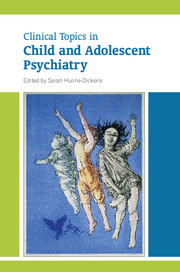Book contents
- Frontmatter
- Contents
- List of tables
- List of boxes
- List of figures
- List of contributors
- Preface
- 1 Child psychiatry and the people who have shaped it
- 2 Fabrication and induction of illness in children
- 3 Personality disorders as disorganisation of attachment and affect regulation
- 4 Post-traumatic stress disorder and attachment: possible links with borderline personality disorder
- 5 Management of antisocial behaviour in childhood
- 6 Pharmacology for attention-deficit hyperactivity disorder, Tourette syndrome and autism spectrum disorder
- 7 Pharmacology for anxiety and obsessive–compulsive disorders, affective disorders and schizophrenia
- 8 Pharmacological management of core and comorbid symptoms in autism spectrum disorder
- 9 Pharmacological treatment of depression and bipolar disorder
- 10 Cognitive–behavioural therapy with children, young people and families: from individual to systemic therapy
- 11 Anxiety disorders
- 12 Somatising: clinical presentations and aetiological factors
- 13 Somatising: management and outcomes
- 14 Evaluating psychological treatments for children with autism
- 15 Attention-deficit hyperactivity disorder: assessment and treatment
- 16 Schizophrenia
- 17 Tourette syndrome
- 18 Sleep disorders
- 19 Self-harm in adolescents
- 20 Adolescent substance misuse: an update on behaviours and treatments
- 21 Eating disorders
- 22 Gender dysphoria in young people
- 23 The psychiatry of children aged 0–4
- Index
9 - Pharmacological treatment of depression and bipolar disorder
Published online by Cambridge University Press: 02 January 2018
- Frontmatter
- Contents
- List of tables
- List of boxes
- List of figures
- List of contributors
- Preface
- 1 Child psychiatry and the people who have shaped it
- 2 Fabrication and induction of illness in children
- 3 Personality disorders as disorganisation of attachment and affect regulation
- 4 Post-traumatic stress disorder and attachment: possible links with borderline personality disorder
- 5 Management of antisocial behaviour in childhood
- 6 Pharmacology for attention-deficit hyperactivity disorder, Tourette syndrome and autism spectrum disorder
- 7 Pharmacology for anxiety and obsessive–compulsive disorders, affective disorders and schizophrenia
- 8 Pharmacological management of core and comorbid symptoms in autism spectrum disorder
- 9 Pharmacological treatment of depression and bipolar disorder
- 10 Cognitive–behavioural therapy with children, young people and families: from individual to systemic therapy
- 11 Anxiety disorders
- 12 Somatising: clinical presentations and aetiological factors
- 13 Somatising: management and outcomes
- 14 Evaluating psychological treatments for children with autism
- 15 Attention-deficit hyperactivity disorder: assessment and treatment
- 16 Schizophrenia
- 17 Tourette syndrome
- 18 Sleep disorders
- 19 Self-harm in adolescents
- 20 Adolescent substance misuse: an update on behaviours and treatments
- 21 Eating disorders
- 22 Gender dysphoria in young people
- 23 The psychiatry of children aged 0–4
- Index
Summary
Major depressive disorder and bipolar disorder can occur in quite young children. However, since both conditions are more common in adolescence than in childhood, and there is a greater evidence base for medication use in this age group, we focus here primarily on adolescents. Mood disorders in children and adolescents are diagnosed using adult criteria, although this is controversial, particularly in paediatric bipolar disorder. The advent of DSM-5 (American Psychiatric Association, 2013) has brought about few changes in the classification of mood disorders: grief is no longer an exclusion criterion for depression, and increased energy/activity is now regarded as a core symptom of mania and hypomania. A new category, disruptive mood dysregulation disorder (DMDD), has been introduced with the aim of reducing inappropriate diagnosis of bipolar disorder in children and adolescents who have non-cyclical, frequent severe temper outbursts along with a persistent irritable mood. Currently, there is little research regarding the diagnosis and treatment of DMDD, but early studies suggest that it is unlikely to be a precursor of bipolar disorder, so it will not be considered further in this chapter.
Prescribing in depression
Background
The prescribing of newer-generation antidepressants to children and adolescents with depression has been controversial in the UK since the publication of the Committee on Safety of Medicines (CSM) report on selective serotonin reuptake inhibitors (SSRIs) (Committee on Safety of Medicines, 2003). This report highlighted the important matter of the nonpublication of negative trial results and questioned both the effectiveness and safety of these medications, particularly an increased risk of suicidality. Before discussing the practicalities of prescribing, we will first review the evidence for the CSM findings. The tricyclic antidepressants will not be discussed here, as the risks associated with these drugs outweigh the relatively small benefits of using them.
Evidence base for pharmacological treatment
The CSM report concluded that, of the new-generation antidepressants (a group which includes the SSRIs and antidepressants such as venlafaxine, a serotonin–noradrenaline reuptake inhibitor or SNRI), only fluoxetine showed a positive risk–benefit ratio in treating depression in young people when compared with a drug placebo (Committee on Safety of Medicines, 2003).
- Type
- Chapter
- Information
- Clinical Topics in Child and Adolescent Psychiatry , pp. 129 - 149Publisher: Royal College of PsychiatristsPrint publication year: 2014



